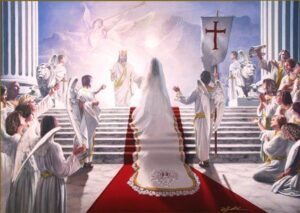
Previously, we analyzed the judgment upon the latter Roman kingdom that is Papal Rome, being the principle vessel of the antichrist spirit, rendered in chapters 17-18 as The Great Mother of Harlots, which illustrates the apostate church that was once so famed for her chaste reputation as an exemplary model of the bride of Christ, had eventually defected to the antichrist spirit to become, not just a harlot, but the mother of all harlots.
The next part of The Revelation in chapter 19 entails that most blessed event — the Wedding Feast of Christ and His Bride; That is the true bride of Christ who remained faithful throughout the temptations, trials and tribulations of the antichrist era. This bliss & blessed event of the second coming of Christ then moves to the next most pertinent matter, whereby the newlywed bride accompanies her eminent Husband to the battle of Armageddon to dislodge the wicked of the earth.
While the overall sense of both events are easy enough to understand, the details are more difficult. Identifying the different parties involved is not so easy to determine with certainty. For instance, we can certainly identify the bride of Christ as His Church made into her perfect state, but who exactly are those guests who attend the celebration of the marriage supper? There are some who say the bride and the guests are one in the same, but if we follow the model of the marriage feast, the bride is certainly distinguished from the guests. Yet both parties are those who accepted the invitation of Christ — so why is there a differentiation?
Such are the kind of questions and details we will address in this next part.
Chapter 19 opens with a loud and exuberant praise from the multitudes in heaven: After these things I heard a loud voice of a great multitude in heaven, saying “Alleluia! Salvation and glory and honor and power belong to the Lord our God! For true and righteous are His judgments, because He has judged the great harlot who corrupted the earth with her fornication: and He has avenged on her the blood of His servants shed by her.”
Just as the scriptures had firmly established that vengeance belongs to the Lord, “For we know Him who said, “Vengeance is Mine, I will repay,” says the Lord. And again, “The LORD will judge His people.” (Hebrews 10:30). Furthermore, the counterpart of judgment against the perpetrator is then vindication for the innocent — as here declared, “… and He has avenged on her the blood of His servants shed by her.” Such a praiseworthy declaration regarding the vindication of the saints of God is also a firmly established precedent so stated in passages like Deuteronomy 32:36, “For the LORD will judge His people and have compassion on His servants, when He sees that their power is gone, and there is no one remaining, bond or free.”
Next is another alleluia declaration regarding the perpetrator: Again they said, “Alleluia! Her smoke rises up forever and ever!” Thus, this final judgment on the great harlot is permanent, with no prospect of any revival as before.
Therefore, such high-spirited praises persist among the multitudes of heavenly hosts in verses 4-5: And the twenty four elders and the four living creatures fell down and worshiped God who sat on the throne, saying, “Amen! Alleluia!” Then a voice came from the throne, saying, “Praise our God, all you His servants and those who fear Him, both small and great!”
Then, the heavenly exultation escalates to a thundering sound like roaring waters in verse 6-7: And I heard, as it were, the voice of a great multitude, as the sound of many waters and as the sound of mighty thunderings, saying, “Alleluia! For the Lord God Omnipotent reigns!” Let us be glad and rejoice and give Him glory, for the marriage of the Lamb has come, His wife has made herself ready!”
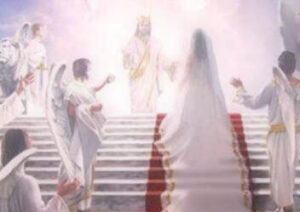 Certainly, such an elevated pitch of thundering praise is well appropriated upon the announcement of this greatly anticipated union of Christ and His bride — “…for the marriage of the Lamb has come, His wife has made herself ready!” — Those many faithful devotees of Christ, rendered here as His wife, who heeded His message to be ready, has made herself ready.
Certainly, such an elevated pitch of thundering praise is well appropriated upon the announcement of this greatly anticipated union of Christ and His bride — “…for the marriage of the Lamb has come, His wife has made herself ready!” — Those many faithful devotees of Christ, rendered here as His wife, who heeded His message to be ready, has made herself ready.
Verse 8: And to her was granted to be arrayed in fine linen, clean and bright, for the fine linen is the righteous acts of the saints. Here, the spot light shines on the fine linen granted to the bride, which the text plainly defines as the righteous acts of the saints.
— but take note that the righteous acts of the saints, figuratively expressed as fine garments, — was granted to her — which conveys the sole source of righteousness provided by none other than Christ. Hence, while the righteous acts of the saints indicates the role of the saints within their covenant relationship with Christ, which involves their commission to perform such duties as needed to make disciples, yet that righteousness which enables the saints to be in communion with God to fulfill their duties comes solely from Christ.
Such provision of much needed righteousness speaks of the role of the initiating party of the covenant, Christ; and such provision springs from the great love He has for His bride. As Saint Paul had instructed, “Husbands, love your wives”, just as Christ also loved the church and gave Himself for her, that He might sanctify and cleanse her with the washing of water by the word, that He might present her to Himself a glorious church, not having spot or wrinkle or any such thing, but that she should be holy and without blemish”. – Ephesians 5:25-27
Such a perfect union can only be consummated by the saints being divinely transformed into their perfect state; Therefore, this juncture indicates the second coming of Christ upon the seventh trumpet, whereby, those of His who are alive in their earthly bodies at this time will be taken up (1 Thes 4:17) and changed (1 Cor 15:51); and those of His who already passed on will be changed — For this corruptible must put on incorruption, and this mortal must put on immortality. (1 Cor 15:52-53)
Before moving on to the next detail, let us make sure we are clear that the bride of Christ are those faithful in Christ, both Jew and Gentile in Christ, and both those who still remain in their earthly bodies as well as those whose earthly bodies have passed away. This concept of the faithful devotees of Christ being the bride of Christ we can be sure by referencing passages such as 2 Cor. 11:2 and Eph. 5:25-27. Now let us move on to consider the other party at the marriage supper:
Verse 9: Then he said to me, “Write: ‘Blessed are those who are called to the marriage supper of the Lamb!'” And he said to me, “These are the true sayings of God”.
So, if the bride of Christ is the faithful in Christ, that is the church — then who are those who are called to the marriage supper of the Lamb??
As already mentioned, some have tried to say the bride and the guests are one in the same, but that does not fit the wedding supper model, which differentiates the bride from the guests. One consideration which almost gives this theory merit is the parable of the wedding feast of Matthew 22:1-14, which illustrates a king who arranged a marriage for his son, and sent out his servants to call those who were invited to the wedding; and they were not willing to come.
This first invitation signifies God’s first chosen people, Israel, who rejected His prophets and His Son. The parable continues with a second invitation to the same people, but they still made excuses and even hated and killed his messengers, so the king destroyed them in his fury, and then invited others from elsewhere (Gentiles), both bad and good, so the wedding hall was filled with guests.
Now, the point of this parable, is to illustrate the fate of those who reject God versus those who accept God, and is not necessarily the same wedding feast as that of Revelation 19. Though we can say they both correspond to some degree, yet the differences are:
- the parable illustrates the Jews as those who reject the invitation while the Gentiles represent those who accept.
- yet the wedding feast of Revelation 19 — the bride represents both Jews and Gentiles who accepted; For all the faithful are one in Christ, according to Galatians 3:28 and Romans 11.
Therefore, those who accepted, that is those who came into covenant relationship with Christ — are the bride of Christ — and not merely guests.
Others have contrived to say the guests are the Jews who come to faith at the end of the age, but I do not find that satisfactory either, since the Jews were the original bride (Psalm 45:10-17, Isa. 54:5, 50:1), and God promises to fully restore those of His first chosen people who repent unto faith to the true Messiah (Nah. 2:2, Isa. 65:8-10, Micah 4, Rom. 11).
What about the angels? Are the angels the guests?
No, because they already belong to the house of God, so they are rather hosts, not guests.
Another theory which is slightly better but still problematic, is the idea that those who are called to the marriage supper are the Christians who still remain in their earthly bodies, while those who’s bodies have passed away are resurrected into their perfect state as the bride of Christ. The problem with this is — according to 1 Cor 15:51-52, which says, “…we will not all sleep (meaning not all the saints will experience the death of their earthly bodies because Christ will return during that generation), but we will all be changed, in a moment, in the twinkling of an eye, at the last trumpet; for the trumpet will sound, and the dead will be raised imperishable, and we will be changed.”; Thus, both those who’s earthly bodies remain as well as those who’s earthly bodies have perished will be changed into their glorified bodies upon the return of Christ.
To be clear, all those in Christ will be one; both Jew and Gentile, both dead and living — all those many faithful devotees of Christ, rendered here as His wife, who heeded His message to be ready, has made herself ready.
So then — who are the guests? Who are those who are called to the marriage supper of the Lamb ??…
Let us turn to a few key passages:
Ezekiel 18:23 — Do I have any pleasure at all that the wicked should die?” says the Lord GOD, “and not that he should turn from his ways and live?
2 Peter 3:9 — The Lord is not slack concerning His promise, as some count slackness, but is longsuffering toward us, not willing that any should perish but that all should come to repentance.
Isaiah 26:9b — For when Your judgments are in the earth, the inhabitants of the world will learn righteousness.
1 Timothy 2:1-4 — Therefore I exhort first of all that supplications, prayers, intercessions, and giving of thanks be made for all men, for kings and all who are in authority, that we may lead a quiet and peaceable life in all godliness and reverence. For this is good and acceptable in the sight of God our Savior, who desires all men to be saved and to come to the knowledge of the truth.
Ezekiel 18:21-22 — “But if the wicked man turns from all his sins which he has committed and observes all My statutes and practices justice and righteousness, he shall surely live; he shall not die. All his transgressions which he has committed will not be remembered against him; because of his righteousness which he has practiced, he will live.”
Now there are countless verses which declare the destruction of the wicked, yet we can’t ignore the many such passages quoted above about God’s desire to have mercy on the wicked who repent. 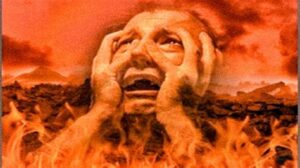 Certainly there are many passages which reveal the ultimate destruction of the wicked upon the return of Christ, yet it seems that at least some may have a chance to repent when the sign of the Son of Man will appear in heaven, and then all the tribes of the earth will mourn… Mat 24:30
Certainly there are many passages which reveal the ultimate destruction of the wicked upon the return of Christ, yet it seems that at least some may have a chance to repent when the sign of the Son of Man will appear in heaven, and then all the tribes of the earth will mourn… Mat 24:30
I submit that those who are called to the marriage supper of the Lamb are those who did not quite make themselves ready, but God had mercy on. For He says to Moses, “I will have mercy on whomever I will have mercy, and I will have compassion on whomever I will have compassion.” (Rom 9:15). Even some of the many wicked whom God may grant forgiveness as declared in Isaiah 26:9 — For when Your judgments are in the earth, the inhabitants of the world will learn righteousness. Therefore it says in the next verse: “Let grace be shown to the wicked…”
If this is the case, then it cannot be overstated how ‘Blessed are those who are called to the marriage supper of the Lamb!’ — For they were on the broad way which leads to destruction (Mat 7:13), yet God having mercy on them to be spared from the general destruction & condemnation they were headed for, are given another chance to learn righteousness. So blessed indeed! And to strongly confirm the testimony of this blessed truth, the angel states, “These are the true sayings of God”.
However, if those who are called to the marriage supper are guests, then those guests are not considered to be a part of the house of Christ, but are just visiting the house to partake in the celebration as guests. Indeed they are blessed to be spared from condemnation and called to celebrate in the house of God, but they still need to learn righteousness and to be tried, tested, and proved, just like the saints were, before confirmed into the family of Christ. The Millennial Reign of Christ will be the proving grounds for those who still need to learn righteousness, which we will get to in the next chapter.
Continuing with verse 10: And I fell at his feet to worship him. But he said to me, “See that you do not do that! I am your fellow servant, and of your brethren who have the testimony of Jesus. Worship God! For the testimony of Jesus is the spirit of prophesy.”
The text does not tell us what the Apostle John was thinking, but only what he did — I fell at his feet to worship him — so we can only wonder whether John was just disoriented from all the overwhelming excitement of this event, or perhaps the angel here is so glorious that John mistook him as God, or perhaps he felt obliged to give this angelic dignitary some form of respect. Either way, the Apostle needed to be corrected as the angel asserted, “See that you do not do that!”; Then clarifying their equality as fellow servants and brethren who have the testimony of Jesus. And to further clarify well placed appropriation of worship, the angel insisted in straight forward fashion, “Worship God!”
The angel then caps the message by saying, “For the testimony of Jesus is the spirit of prophesy.” Both of them as servants of God bearing testimony of Jesus, which is the essence of prophesy.
Here, at this time of the return of Christ, at the last trumpet, which is the seventh trumpet and ‘third woe’ (Rev 8:13), there is a combative counterpart to the blessed wedding supper of God’s family; There is the sure judgment upon those who are hellbent on fighting against God; Those wicked souls of man and rebel spirits who are so delusional that they actually believe Lucifer is the true & prevailing god; and Woe indeed to those obstinate souls.
Thus, the scene switches from the wedding supper to the battle field, which detail indicates the same battle referred to in the sixth and seventh vial as the battle of Armageddon (Rev 16:12-21), here being rendered in a different way to display the supreme sovereignty of Christ and the role of His saints:
Verses 11-13: Now I saw heaven opened, and behold, a white horse. And He who sat on him was called Faithful and True, and in righteousness He judges and makes war. His eyes were like a flame of fire, and on His head were many crowns. He had a name written that no one knew except Himself. He was clothed with a robe dipped in blood, and His name is called The Word of God.
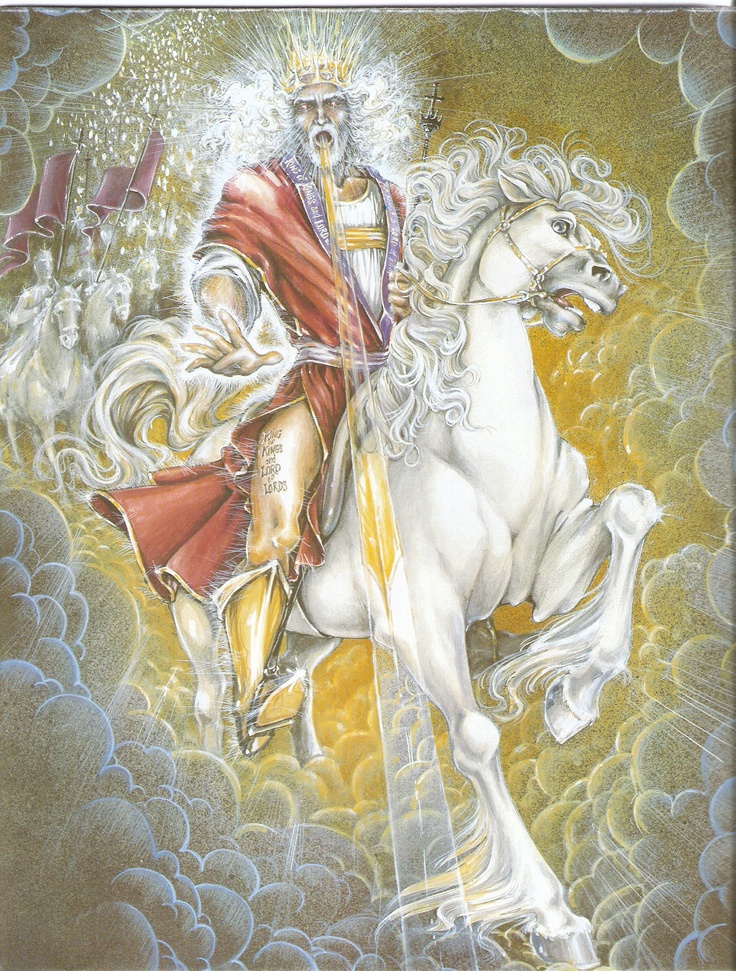 Here, the Apostle John sees Christ advancing as a conquering warrior king, which is comparable to the opening vision of John’s Revelation of Jesus Christ in 1:12-16, the First Seal in Rev 6:1-2, and Psalm 45. Other such attributes presented here — a righteous judge and general — who was called Faithful and True with fierce features described as eyes like a flame of fire — and having a vast kingdom rendered as — on His head were many crowns.
Here, the Apostle John sees Christ advancing as a conquering warrior king, which is comparable to the opening vision of John’s Revelation of Jesus Christ in 1:12-16, the First Seal in Rev 6:1-2, and Psalm 45. Other such attributes presented here — a righteous judge and general — who was called Faithful and True with fierce features described as eyes like a flame of fire — and having a vast kingdom rendered as — on His head were many crowns.
The next detail speaks of the enigmatic nature of God — He had a name written that no one knew except Himself.
A name signifies one’s character and attributes, thus many names are ascribed to the Son of God to signify His character and many attributes; and many which are knowable & understandable, just as the Apostle John states in his first letter, “And we know that the Son of God has come and has given us an understanding, that we may know Him who is true…” 1 John 5:20
Yet, the full nature of God goes beyond our understanding, unto the depths of His incomprehensible wonders, just as the Apostle Paul reflects, “Oh the depth of the riches of both the wisdom and knowledge of God! How unsearchable are His judgments and His ways past our finding out! For who has known the mind of the LORD?” (Romans 11:33), Thus, the Apostle John speaks here of the incomprehensible nature of the Son of God by declaring, “He had a name written that no one knew except Himself.”
Next detail of the rider of the white horse — He was clothed with a robe dipped in blood — by conquering the power of death and sin by the shedding of His own blood, Christ fully & legitimately possesses all power and authority to judge and make war against all principalities who have set themselves against the Kingdom of God with their antichrist kingdom, who are now appointed to pay for such abominations with their own blood, and destitute of any means which could possibly redeem themselves from the grave.
— and His name is called The Word of God — here we have confirmation of the identity of the rider of the white horse as Jesus Christ, Who the Apostle John introduced in the opening of his gospel as The Word of God.
Verse 14: And the armies in heaven, clothed in fine linen, white and clean, followed Him on white horses.
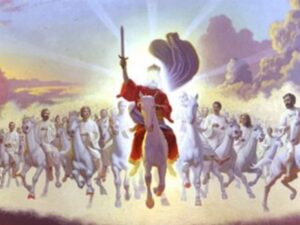 — the armies in heaven — typically refers to the angels of God, but at this juncture it seems to include, if not mean principally, the faithful saints of God, the bride of Christ, who endured through the temptations and tribulations of the evil world system to follow her Husband. And as we continue, we will see details which indicate these are the same heavenly host as those multitudes of saints in heaven described in chapter 14 — who follow the Lamb wherever He goes… Rev 14:1-5
— the armies in heaven — typically refers to the angels of God, but at this juncture it seems to include, if not mean principally, the faithful saints of God, the bride of Christ, who endured through the temptations and tribulations of the evil world system to follow her Husband. And as we continue, we will see details which indicate these are the same heavenly host as those multitudes of saints in heaven described in chapter 14 — who follow the Lamb wherever He goes… Rev 14:1-5
— clothed in fine linen, white and clean — the fine clothing of the bride defined in verse 8 as the righteous acts of the saints — and sharing in the same power and authority as her glorious warrior king — followed Him on white horses.
Verses 15-16: Now out of His mouth goes a sharp sword, that with it He should strike the nations. And he Himself will rule them with a rod of iron. He Himself treads the winepress of the fierceness and wrath of Almighty God. And He has on His robe and on His thigh a name written: KING OF KINGS AND LORD OF LORDS.
— Now out of His mouth goes a sharp sword — this being another detail corresponding to St John’s first vision of Jesus Christ with a double-edged sword proceeding from his mouth in 1:12-16 — that with it He should strike the nations. And he Himself will rule them with a rod of iron — in fulfillment of prophesies such as Psalm 2:9: You shall break them with a rod of iron; You shall dash them to pieces like a potter’s vessel.’ ”
Such expressions further signify how Christ has full possession of all power & authority to execute judgment upon the nations with the fierceness of His wrath, which has been provoked by excessive wickedness, and is further expressed with the prophetic motif of ‘harvest & vintage’ — He Himself treads the winepress of the fierceness and wrath of Almighty God — this being the same way the second coming of Christ was expressed in Revelation 14, which corresponds to this vision of Christ and His armies of saints.
As the finale of this epic vision of the almighty greatness of Jesus Christ, the Apostle John’s description of the conquering warrior king is capped with his account of the name ascribed to such greatness — And He has on His robe and on His thigh a name written: KING OF KINGS AND LORD OF LORDS — which is the name that all will fully understand at this time of His second coming in glory and majesty.
The remaining verses of chapter 19 describe the battlefield scene of this third woe.
Verses 17-18: Then I saw an angel standing in the sun; and he cried with a loud voice, saying to all the birds that fly in the midst of heaven, “Come and gather together for the supper of the great God, that you may eat the flesh of kings, the flesh of captains, the flesh of mighty men, the flesh of horses and of those who sit on them, and the flesh of all people, free and slave, both small and great.”
The meaning of an angel standing in the sun is a curious expression and I am not certain of its meaning, but remembering the sun is a prophetic symbol of the highest governing agent, I do lean towards what Charles Daubuz submitted, saying,
“The sun, or supreme governor, is now Christ Himself, and therefore the angel standing in the sun represents some prince, who being raised in power, and acting by the direction and influence of Christ, will invite the aforesaid persons to fall on the enemies of Christ, in order to seize on their spoils.”
Therefore, an angel standing in the sun deems a fit representation of some prince standing in the power & authority of Christ to proclaim the sure & imminent judgment of God through this invitation of the great spoil of war.
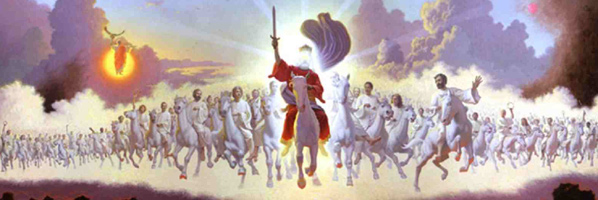
Now we must, once again, consider the vital cross references to prophesy language as we observe how this great invitation to the birds of the air to feast on the spoils of battle is another prophetic genre we have seen expressed through past prophets such as Ezekiel 39:17-20,
And as for you, son of man, thus says the LORD God,
‘Speak to every sort of bird and to every beast of the field:“Assemble yourselves and come;
Gather together from all sides
to My sacrificial meal
which I am sacrificing for you,
a great sacrificial meal on the
mountains of Israel,
that you may eat flesh and drink blood.
You shall eat the flesh of the mighty,
drink the blood of princes of the earth,
of rams and lambs,
of goats and bulls,
all of them fatlings of Bashan.
You shall eat fat till you are full,
and drink blood till you are drunk,
at My sacrificial meal
which I am sacrificing for you.
You shall be filled at My table
with horses and riders,
with mighty men
and with all the men of war”
says the Lord God.
Interestingly, this great slaughter of the judgment of God through Ezekiel details the aspect of a great sacrificial meal, which may be understood of the slaughter of Armageddon as well; Though, more importantly, this great judgment sets the record straight about who reigns supreme, which becomes the obvious realization in both scenarios, just as it’s expressed in the following verses of God’s declaration through Ezekiel: “I will set My glory among the nations; all the nations shall see My judgment which I have executed, and My hand which I have laid on them. So the house of Israel shall know that I am the LORD their God from that day forward.” – Ezekiel 39:21-22
Thus far we have identified an angel standing in the sun as some prince standing in the power & authority of Christ to proclaim the sure & imminent judgment of God in the manner in which he cried with a loud voice, saying to all the birds that fly in the midst of heaven, “Come and gather together for the supper of the great God, that you may eat the flesh of kings, the flesh of captains, the flesh of mighty men, the flesh of horses and of those who sit on them, and the flesh of all people, free and slave, both small and great.”
Some have interpreted all the birds that fly in the midst of heaven as God’s elect, who Christ describes as being caught up with Him in the clouds of heaven in Matthew 24:30-31, who, in ultimate triumph upon the return of Christ, shall inherit the earth, as Christ said in Mat 5:5, which may be rendered here as birds that claim the spoils of war. This interpretation seems acceptable to me since God’s elect, or bride, is participating in the battle, and would therefore be expected to participate in the spoils of battle.
Verses 19-20: And I saw the beast, the kings of the earth, and their armies, gathered together to make war against Him who sat on the horse and against His army. Then the beast was captured, and with him the false prophet who worked signs in his presence, by which he deceived those who received the mark of the beast and those who worshiped his image. These two were cast alive into the lake of fire burning with brimstone.
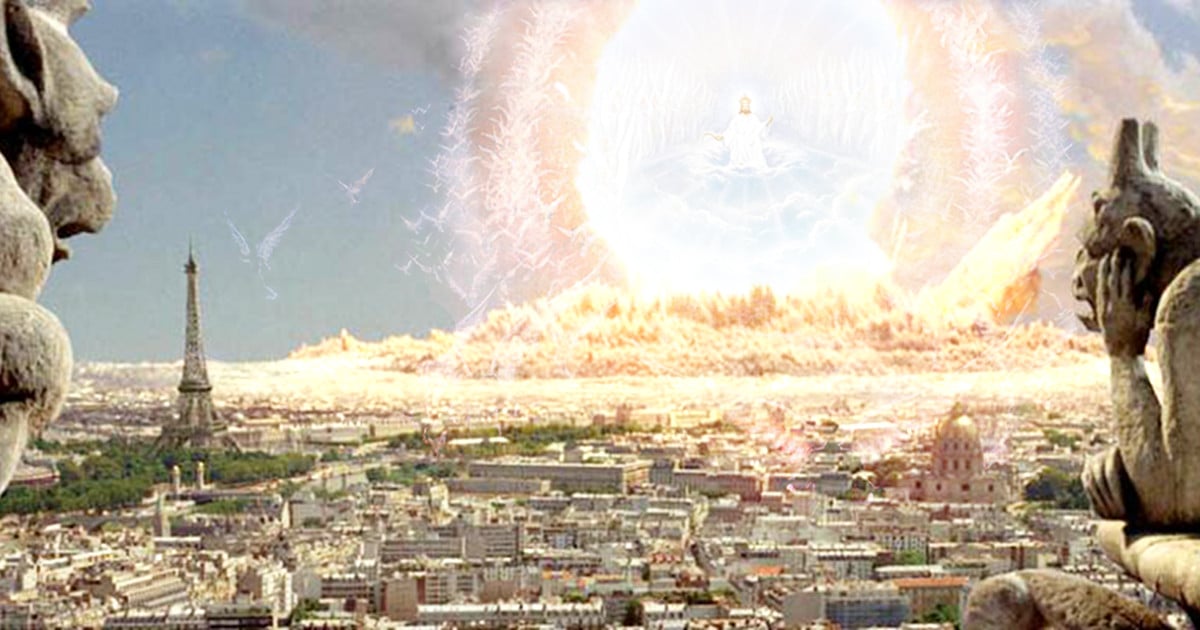
Here, the showdown is described, which results in the capture of the beast and the false prophet. Remember how prophesy language employs the word beast to signify a great kingdom, and in this timeframe is the latter Roman kingdom, so is not a private entity, but a corporate body of not only human souls, but principally wicked spirits behind the beast and false prophet. – Rev 18:2
— the false prophet — is the same as the mouth of the beast of Revelation 13, speaking great things and blasphemies, and given authority over every tribe, tongue and nation, who was even another beast, or kingdom within a kingdom, that is the papal dynasty, being the supreme ruling power of the beast, or Roman kingdom, who is the mouthpiece of Rome as well as the image of Rome — who worked signs in his presence (Rome’s presence), by which he deceived those who received the mark of the beast and those who worshiped his image (Rome’s image being the pope).
Thus, the beast (Rome) and the false prophet (popes), being more than just a physical corporeal, is a spiritual body of wicked spirits, as so stated in the previous chapter (Rev 18:2) – a dwelling place of demons, a prison for every foul spirit, and a cage for every unclean and hated bird!
– a prison and a cage – expresses their bondage to their evil course. Though it may seem they are free as the birds of the air, seemingly flying freely to and fro, just as Satan is described as the prince of the power of the air (Eph 2:2) and as Beelzebub (lord of the flies), yet are bound to their wicked cult; Hence, Babylon, being another way to render Papal Rome, is further described as a cage for every unclean and hated bird – and rendered here in verse 20 as the beast and false prophet.
— These two were cast alive into the lake of fire burning with brimstone — a terrifying image of the utter destruction of the beast and the false prophet, which is primarily referring to the great judgment upon the rebel angels & demons (Rev 18:2); — fire burning with brimstone reminds us of the terrifying judgment of Sodom and Gomorrah destroyed with fire and brimstone.
Final verse 21: And the rest were killed with the sword which proceeded from the mouth of Him who sat on the white horse. And the birds were filled with their flesh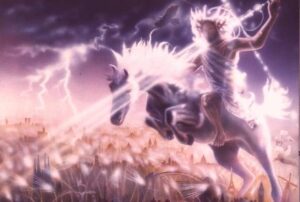 — the rest — being the kings of the earth, captains, mighty men, and all people, free and slave, small and great — were killed with the sword which proceeded from the mouth of Him who sat on the white horse — and in their death, will await their ultimate judgment yet to come, which we will get to in the next chapter. All those souls under the influence and control of the antichrist spirit, the same spirit which rejected Christ during His first visitation, and those who largely rejected Him because He did not come as the military judge to conquer the oppression of Imperial Rome as expected, finally comes as that Conquering Warrior King to destroy all those who have committed to the antichrist spirit of Papal Rome at this epic point in the eschatology.
— the rest — being the kings of the earth, captains, mighty men, and all people, free and slave, small and great — were killed with the sword which proceeded from the mouth of Him who sat on the white horse — and in their death, will await their ultimate judgment yet to come, which we will get to in the next chapter. All those souls under the influence and control of the antichrist spirit, the same spirit which rejected Christ during His first visitation, and those who largely rejected Him because He did not come as the military judge to conquer the oppression of Imperial Rome as expected, finally comes as that Conquering Warrior King to destroy all those who have committed to the antichrist spirit of Papal Rome at this epic point in the eschatology.
Yet there is still a very significant detail to wrap up regarding the one who’s time as the prince of this world has expired, which we will get to in the next chapter — The Millennial Reign of Christ
Main Sources
– Word & Spirit of God, Who Was and Is and Is to come
– Moses Lowman – “Paraphrases and Notes on the Revelation of St. John“
– John Clark Ridpath – ‘Ridpath’s Universal History’
– Charles Daubuz – “A Perpetual Commentary on the Revelation of St. John“
– E H Broadbent – “The Pilgrim Church”
– John Gill – “Gill’s Exposition of the Bible“
– Thomas Newton – “Dissertations of the Prophesies” – Volumes 1-3
– Albert Barnes – “Barnes’ Notes on the Entire Bible
– Peter DeRosa – ‘Vicars of Christ: ‘The Dark Side of The Papacy’
– Adam Clark – “Clark’s Commentary on the Bible“
– Ian Paisley – ‘The Pope is the Antichrist‘
– Augustus Toplady – ‘The Road To Rome’
– Joseph Benson – “Benson’s Commentary on Revelation

